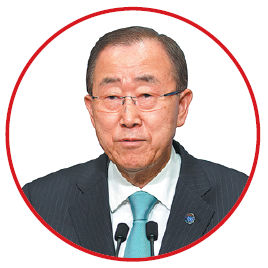
June 13, 1944
EDUCATION:
1970: BA in international relations from Seoul National University, Republic of Korea
1985: Master of Public Administration from Harvard University, United States
CAREER:
1987-90: Counselor at the ROK embassy to the United States
1990-92: Director of American affairs at the ROK Foreign Ministry
1995-96: ROK vice-minister for Policy Planning and International Organizations
1996-98: National security adviser to the ROK president
1998-2000: ROK ambassador to Austria
2000-01: ROK vice-minister of foreign affairs
2003: Foreign policy adviser to the ROK president
2007-16: United Nations secretary-general
2018: Chairman of the Boao Forum for Asia
Ban urges China to increase presence on world stage

Ban Ki-moon, former UN secretary-general, summarized China's 40 years of reform and opening-up by using one of his favorite phrases - "With great success, comes great responsibility."
He added, "It's hard to describe the phenomenal changes and development China has made with the reform and opening-up of Chinese society and the economy since 1978."
Describing China's economic achievements during the past four decades as "a miracle", Ban said that in addition to making its own people richer, the country's contribution to the world has been to set a development model for other developing nations.
He noted that in 1978, the year the policy was adopted, China's GDP accounted for just 2 percent of the global total, and many people in the country were living below the poverty line.
However, economic and social development in China has grown in leaps and bounds as a result of the policy.
According to the National Bureau of Statistics, China's GDP rose by 6.9 percent to $12.06 trillion last year, one-fifth of the global total and surpassing the United Kingdom, Germany, and Japan to retain the country's position as the world's second-largest economy. Moreover, the monthly per capita disposable income of China's urban workers rose to $5,245, 104 times higher than in 1978, while rural monthly per capita net incomes rose to $1,935 from $20.
"One of the greatest achievements of China's economic growth is that it has lifted more than 700 million people out of absolute poverty, accounting for 70 percent of global poverty reduction during the period," Ban said.
Stressing the importance of China's poverty alleviation efforts, he added that the country has also made a commitment to accept more responsibility within the international community.
Nearly two years' after leaving the UN, the 74-year-old still appreciates China's continued leadership and multilateral engagement within the organization in support of resolving regional and global challenges.
Ban held office from 2007 to 2016, and during his tenure he was a keen promoter of tackling climate change and other global challenges.
"During my two terms as UN secretary-general, I am proud to have prioritized and expanded the importance of the organization's global development efforts," he said.
In 2015, the UN and its 193 member countries passed the 2030 Agenda and its 17 sustainable development goals. Ban said the goals offer the world a way to confront the most critical issues of our time, including poverty reduction, education, inequality, climate change, improvements in public health, and gender equality.
The initiative called for "multistakeholder partnerships that mobilize and share knowledge, expertise, technology and financial resources to support the achievement of the sustainable development goals in all countries", Ban said.
He added that in the three years since the goals were adopted, progress remains uneven and some sectors and regions are moving faster than others. However, he also noted that cooperation between the UN and China has accelerated, and said the country's crucial role in advancing the goals at home and abroad is providing a better quality of life for the world.


